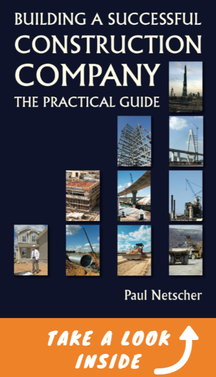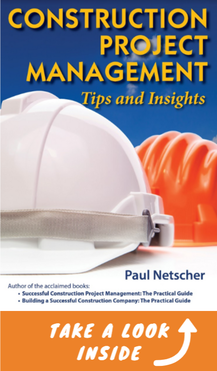"Some contractors price any and every construction project without really putting thought into the project" Some contractors price any and every construction project without really putting thought into the project, the client, or whether they are able to submit a competitive price. I feel sorry for their estimators who work long hours, often working on several proposals at one time, and all too frequently with little success. Simply pushing out one construction proposal after the other! However, there are huge risks with this approach, and aside from the wasted effort, there’s real danger the company is awarded a construction project that could ultimately destroy them. Before pricing your next construction project ask these questions (and live to price the next one!) Before pricing your next construction project ask these questionsSo before pricing a construction project decide whether your company wants the project or not. There may be certain construction projects that you really want, in which case put extra effort into preparing the estimate and presenting your tender or quotation. But there are other projects that should be avoided. Before beginning a project estimate ask these questions: 1. Will you be paid for the work – A few clients are notorious for not paying their contractors. Do you really want to be working for free? Other clients may be experiencing financial woes and it would be devastating to your company if they went into liquidation part way through the project leaving your invoices unpaid and an unfinished project. Do background research on your prospective clients. 2. Do we want to work for this client – Some clients are notoriously difficult to work for. They may be disorganised, employ a weak design team, continuously change their minds, be litigious, refuse to pay for legitimate variations, pay valuations late, deduct monies for little reason, demand excessive paperwork or continuously interfere in the contractors operations. All of this costs contractors money and frustrates their employees. I’ve known contractors refuse to work for some clients, or add a premium to their price to compensate for additional costs and frustrations they know they’ll experience with the client. But, do you really need the stress and distractions of being involved with this client, and can you afford to be distracted from your other projects? what makes a good client? 3. Do we want to construct the project – Some projects are easier than others. A few can be particularly demanding requiring an inordinate amount of supervision and management time. Occasionally projects involve difficult working conditions such as working around existing services and infrastructure, or face environmental or other delays, even public protests. Will the efforts of dealing with these problems be worth it? At times we can’t be picky and have to take on these projects, or maybe there are other benefits that outweigh the disadvantages. But often there are more appropriate projects that you could be focussing on. 4. Have you the knowledge, and experience to construct the project – Unfortunately I’ve seen contractors win a project and then run around looking for appropriate staff. Some projects are easy if you have the experience, but can be difficult for those who don’t have the knowledge. A contractor who usually builds roads will have difficulties taking on a building project and a building contractor may not have the experience to construct a road. Of course a savvy client wouldn’t award a project to a contractor they felt didn’t have the right experience for the project. "You don’t want to be awarded a project and then be scrambling around trying to find a project team, literally hiring people off the street." 5. Will we have the resources available to do the work – You don’t want to be awarded a construction project and then be scrambling around trying to find a project team, literally hiring people off the street. I’ve had construction projects fail due to this. Having the wrong project team can mean the project is executed poorly impacting the company’s reputation and even resulting in the project losing money. It may impact other projects as management becomes stretched. Resources also include construction equipment. Some construction projects require expensive items of equipment which the company may not be able to afford, or maybe the equipment isn’t available or there are long lead times to procure the construction equipment which will delay the project. 6. What are the project risks and are they acceptable – Sometime back a good client of ours asked us to undertake a low value construction project which involved excavating and removing buried electrical cables in the middle of a gas refining plant. The operation was going to be difficult and dangerous. The risks of something going wrong were high and the results could have been catastrophic. A serious incident would have made the news, disrupted the owner’s production, tarnished our reputation and even injured or killed people. The profits from such a small project certainly didn’t warrant the risks. We declined to price the construction project. The client insisted, so we priced the project ensuring we made adequate allowance for supervision and training, took out suitable insurance, mitigated risks and transferred some risk to the owner. We added additional profits to compensate for the remaining risk. The risks on some projects could destroy a company should they eventuate. Understand the risks. If they can’t be adequately mitigated then don’t price the project. The different types of risks involved in Construction Project Management 7. Do you have the knowledge and experience to price the project –some construction projects may be in a region where you haven’t worked before. Various states and countries have different rules and regulations, differing taxes, wage rates, safety regulations and environmental laws. Compliance with these could add thousands of dollars to the project price. Importing materials and equipment into another country can be a costly and tedious process. Worker certification and requirements could be onerous adding additional costs and causing delays. Furthermore, constructing facilities for different owners can cause complications – constructing an office building in oil and gas plants is a different ball game to building one in the city. Different forms of construction require different skills and knowledge. Many years ago a construction company priced a sand pump station in the ocean. An estimator without sufficient experience guessed how they would build the coffer dam in the ocean. Without experience they didn’t allow for the constant waves, storms and tidal action. The project was awarded to them and cost the contractor double the contract price and took twice as long as planned. You can ask experts to help, or even joint venture with a company with the experience and knowledge. Alternatively don’t guess, don’t price the project. 8. Will your price be competitive – We didn’t price construction projects where we knew we wouldn’t be competitive. Not only would it have been a waste of effort, but a high price could put the client off asking us to price another project in the future. Always understand your opposition for the project – are they more desperate for the project than you, maybe they’re working on another project close by which could give them the competitive advantage of being able to share resources. Some companies are just good at doing certain projects or have a good working relationship with the client. Understand you limitations and if you know your price won’t be competitive rather decline pricing the construction project with a courteous letter to the client. 9. Is there sufficient time to price the project properly – Clients often expect contractors to perform miracles and price a construction project in a ridiculous short period of time. In other cases, you only become aware of the tender (request to price) after the other contractors. If the period is too short to price the project you end up guessing some prices, you make errors in the rush and don’t spend sufficient time preparing a good tender (price) submission. A poorly completed tender or quotation is a poor reflection on your company. An error made in the haste could cost the company severely should you be awarded the construction project. Ask for more time to price the project or respectfully decline pricing it. 10. Will the construction project go ahead – We were often asked to price projects which we knew wouldn’t happen. The client didn’t have sufficient funding, they didn’t have the relevant permits and probably wouldn’t receive them in the near future, or they were just on a fishing trip to test the feasibility of the project. If it is a loyal client, or if your estimators have the time, then by all means go ahead and price the project knowing you are merely doing the client a favour with little expectation that the construction project will eventuate. Bear in mind though you will also waste supplier’s and subcontractor’s time asking for prices and they won’t appreciate their time being wasted on too many of these projects. Review projects before pricing them"Put effort into pricing the right construction project" Construction companies have been destroyed because they worked for the wrong client, a client that didn’t pay, a project which became embroiled in a legal nightmare, one that hit the news headlines for the wrong reasons or one where things that could have been anticipated went wrong. Contractors may blame this on bad luck, but I’m certain that many of these events could have been foreseen when the project was priced, and a prudent contractor would have asked the questions above and the answers would have meant they didn’t bother pricing the project. Their efforts could have been better spent pricing projects they really wanted, projects for good clients and projects where money could be made. So why not set a system in place where projects are reviewed before a decision is made to proceed with preparing and submitting a tender or quotation. Time spent on this action will definitely reduce your company’s risks and improve the lives of your estimating team. Should contractors price every project? This article was first published on the ClockShark website - Get The Industries' #1 Time-Tracking AppRunning a field service or construction business takes coordination and a great team. With ClockShark you get the industries' #1 timesheet app, plus everything you need to finish jobs quickly and accurately while getting paid faster. "Very useful guide regarding the management of the construction projects. Open, direct and insightful." (Reader - Amazon.co.uk) Paul Netscher has written several easy to read books for owners, contractors, construction managers, construction supervisors and foremen. They cover all aspects of construction management and are filled with tips and insights.
Visit to read more. The books are available in paper and ebook from most online stores including Amazon. construction management construction project management
0 Comments
Leave a Reply. |
Archives
June 2024
Note: We welcome genuine comments, especially comments that add additional information to the subject matter in the article. We however reserve the right to remove inappropriate comments, which includes comments that have nothing to do with the subject, comments that include inappropriate language, and comments that are an advertisement for a product or company, or which include an advertising link. Comments must be in English. We will not enter into discussion on why a particular comment was removed.
CategoriesCopyright 2016 - The attached articles cannot be reproduced for commercial purposes without the consent of the author.
The opinions expressed in the attached articles are those of the writer. It should be noted that projects are varied and different laws and restrictions apply which depend on the location of the contractor and the project. It's important that the reader uses the supplied information taking cognisance of their particular circumstances. The writer assumes no responsibility or liability for any loss of any kind arising from the reader using the information or advice contained herein. "I have what I consider some of the best books on construction management."
Books are available from: Amazon.com Amazon.co.uk takealot.com kalahari.com Amazon.in Amazon.de Amazon.fr Amazon.it Amazon.com.au Powell's Fishpond uread bokus Amazon.ca Amazon.es Other retail stores Available in paperback or on Kindle "28 YEARS OF CONSTRUCTION PROJECT MANAGEMENT EXPERIENCE, DEVELOPING SUCCESSFUL CONSTRUCTION PROJECT MANAGERS AND BUILDING SUCCESSFUL CONSTRUCTION COMPANIES"
|







 RSS Feed
RSS Feed




